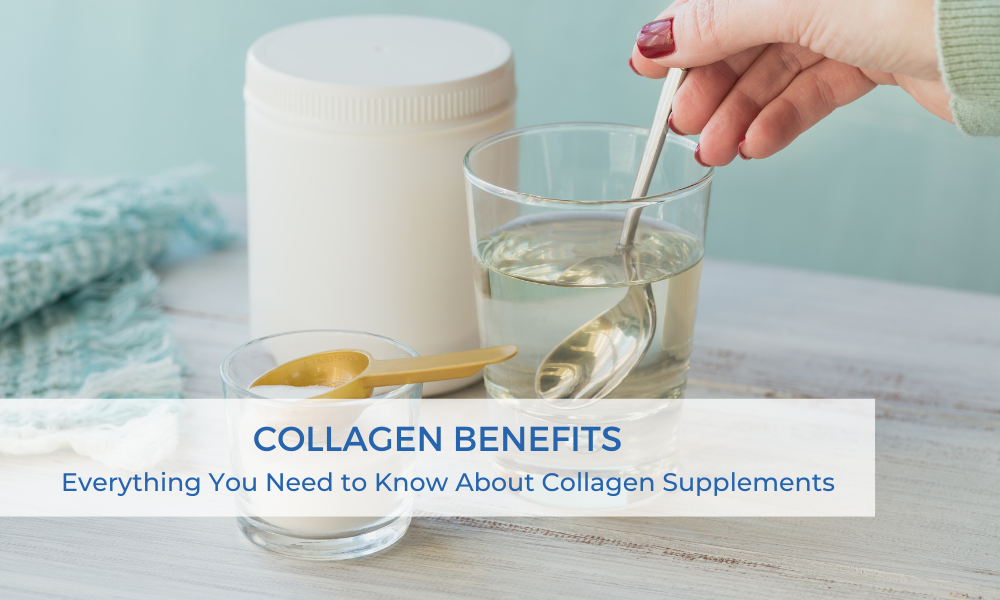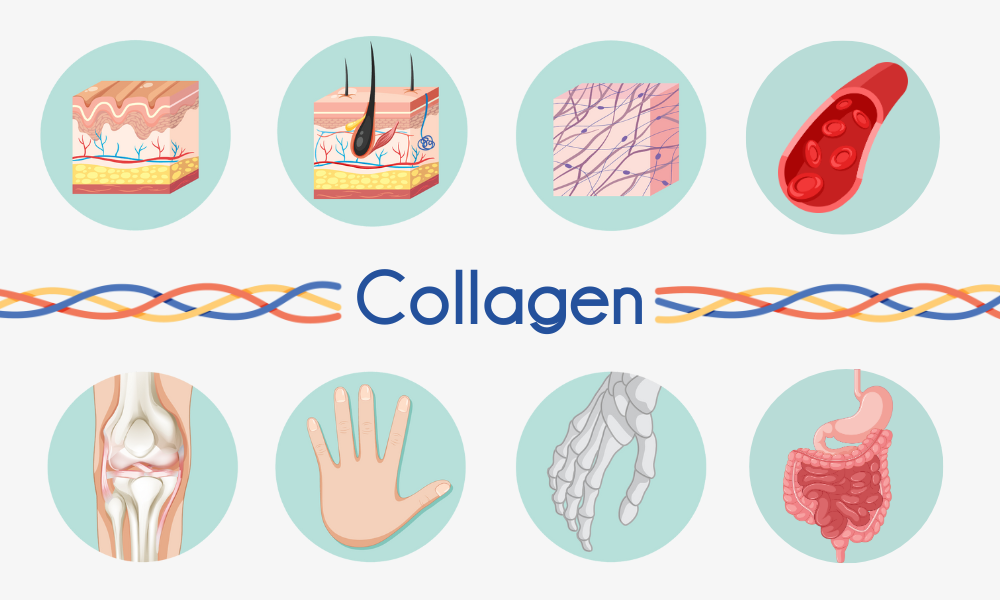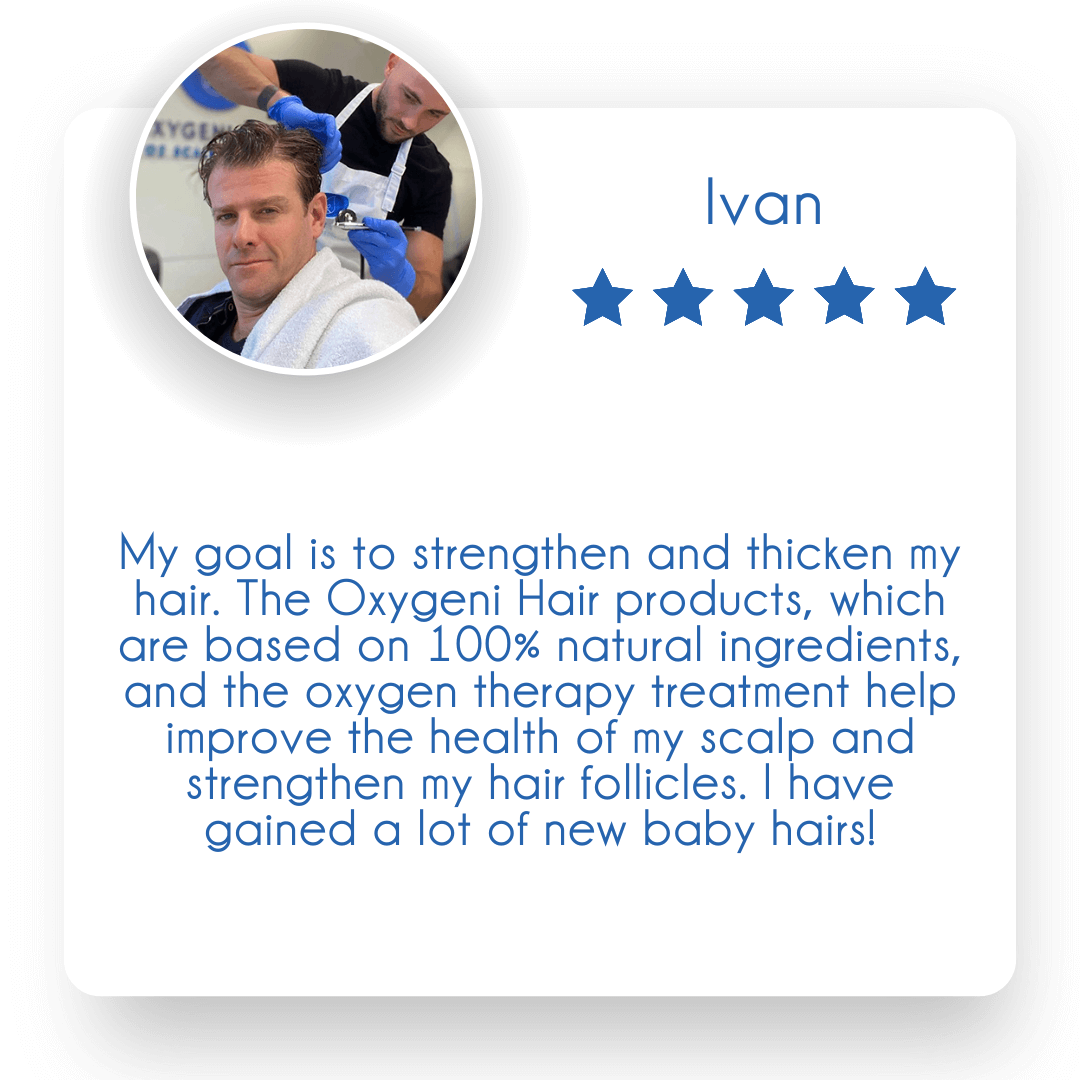Collagen benefits

Collagen Benefits: Everything You Need to Know About Collagen Supplements
Collagen is a key factor in maintaining our health and beauty, so we should pay special attention to adequate collagen supplementation. As we age, our bodies produce less collagen, which eventually leads to wrinkles and joint pain. Many collagen products are available as remedies, but their effectiveness can vary widely. This is partly because there are different types of collagen, each serving distinct functions in our bodies. In the next sections, we’ll cover what’s needed for effective collagen utilization and guide you in choosing the right product for optimal results.
What is Collagen?
Let’s start with the most important question: what exactly is collagen? Collagen is the protein that fills the spaces between cells and connects them within our bodies. It is found in connective tissues, bones, muscles, blood vessels, and the skin as well. Collagen is a vital component of the body, making up three-quarters of the skin and one-third of all proteins. Although there are many types of collagen, we distinguish three main types based on their functions and the amounts found in the body:
Type I Collagen
This is the primary form of collagen present in the body, constituting nearly 90 percent of the collagen. It is found in almost every tissue: in the skin, hair, nails, bones, tendons, ligaments, and even in the cells of internal organs. It is incredibly strong and flexible, providing structural integrity and elasticity for the tissues.
Type II Collagen
Primarily present in cartilage and joints, type II collagen makes up more than half of the proteins found in cartilage, providing cushioning between bones and joints. Despite having a looser structure than type I collagen, it is also highly concentrated in tendons and bones.
Type III Collagen
This type of collagen is mainly found in tissues with elastic properties, such as the skin, muscles, internal organs, and blood vessel walls. It is also present in smaller amounts in bones and tendons, alongside types I and II collagen. Its primary role is to maintain the elastic fiber networks in soft tissues.

The three main types of collagen play crucial roles in the body, so it’s concerning when these molecules start to decrease and production levels become insufficient. Supplementing collagen from external sources can help address collagen deficiency and help prevent the onset of serious health and cosmetic concerns.
Symptoms of Collagen Deficiency
Collagen is vital for the human body, yet as part of the aging process, the body produces less and less of it. Around the age of 25, collagen levels in our bodies begin to decline slowly, which can start to cause minor issues after the age of 40-50, and in older individuals, it can lead to quite challenging symptoms.
Collagen deficiency cannot be detected through laboratory tests; however, early recognition of the symptoms can help prevent more severe problems later on.
Dry Skin and Wrinkles
One of the first signs of collagen deficiency is the skin’s lack of elasticity and dryness, which can precede the formation of wrinkles. While wrinkling is a completely natural process that comes with aging, collagen deficiency can accelerate the appearance of wrinkles and increase the risk of developing other more serious skin problems.
Joint Pain and Cartilage Deterioration
A well-known symptom of collagen deficiency is joint pain and cartilage abrasion. However, viewing this alongside wrinkling as a natural occurrence is a significant mistake. Initially, cartilage degeneration may only cause minor pains and discomfort, but it can later lead to severe musculoskeletal limitations, which is certainly not worth risking. It is advisable to take steps toward collagen supplementation at the first signs of joint stiffness. Always consult your doctor before taking any supplements!
Other Symptoms
In addition to the common issues we might consider, certain symptoms that we might not initially think are related to collagen deficiency can also arise. These symptoms can include frequent muscle pain, inflexible tendons and ligaments, and certain gastrointestinal problems that may arise due to thinning of the intestinal mucosa.

Who Can Be Affected?
Collagen production decreases not only with age but is also significantly influenced by an unhealthy lifestyle. Smoking, excessive alcohol consumption, and high intake of refined sugars and carbohydrates all reduce collagen absorption in our bodies. Moreover, sun exposure without sunscreen contributes to the breakdown of collagen molecules, which is why sun protection is essential.
Elderly Individuals, Women After Menopause
Symptoms associated with aging, such as cartilage deterioration and wrinkling, are not solely problems for the older generation. While it is true that the elderly are much more susceptible to diseases related to collagen deficiency, they are not the only affected individuals; the more severe symptoms are simply more pronounced in them. For women, especially after menopause, it is crucial to pay attention to adequate collagen intake, as it can play a role in preventing osteoporosis.
Other Affected Individuals
People suffering from gastrointestinal and digestive disorders, regardless of age, can benefit from an optimal dosage of collagen. New mothers may also find collagen consumption advantageous due to the increased estrogen levels and the baby’s development. Additionally, those following various meat-free diets, such as vegans or vegetarians, need to supplement collagen from external sources, as they cannot obtain it through their chosen diets.
Where can collagen be found?
At this point, you may be wondering how to intake collagen, given its importance for the human body. One possible answer is through a balanced diet. However, it is essential to clarify that the collagen found in various foods does not absorb directly during digestion; instead, it breaks down into various amino acids, which the body may later use to produce collagen. For this reason, the effectiveness of consuming collagen-rich foods cannot be guaranteed, but these foods should certainly be part of a varied diet.
Foods:
When thinking about collagen and food, you might immediately think of gelatin or the less traditional jelly. These foods can indeed be rich in collagen, as they are made from animal bone marrow and cartilage, primarily from pigs and cows. However, due to their saturated fats and refined sugars, they are better avoided. This is not the case for bone broth, which you can easily make from chicken or a bit of fatty meat. Additionally, fish, which are the only natural source of collagen, should not be overlooked, as their scales are rich in beneficial collagen.
Vitamins and Antioxidants:
Following a diet rich in vitamins and antioxidants is recommended to stimulate the body’s collagen production. Vitamin C, zinc, copper, proline, and glycine significantly contribute to optimizing collagen production, and these can mostly be obtained through fruits, vegetables, and nuts. While it is possible to consume a certain amount of collagen with a proper and balanced diet, if you want to be certain—especially if you are over 25-30—collagen supplements may be the best solution for collagen supplementation.

It’s not easy to find high-quality collagen supplements, as most products are derived from by-products of the meat industry and discarded fish. Unfortunately, there are very few products that come from organic sources. Therefore, it’s essential to always check the source of collagen, and be especially cautious with products made from Southeast Asian Pangasius fish. This type of fish is farmed under terrible conditions and is kept alive with antibiotics, which can subsequently enter the human body and cause harm.
Don't Shy Away from Fish Collagen!
If you have an autoimmune or inflammatory condition, such as thyroiditis, fish collagen may be your only viable alternative option. Fish collagen does not contain any Neu5Gc, which is particularly harmful for inflammatory diseases as it can easily exacerbate inflammation in the body. Neu5Gc is a sialic acid derivative found in many bovine or porcine collagen products, and individuals with autoimmune diseases should avoid these because they can trigger excessive immune reactions. Products derived from mammals can even provoke cellular-level inflammatory responses in sensitive individuals.
What Supplement Should You Choose?
With a wide range of collagen-ritch products available on the market, selecting the one that results in optimal collagen levels is not easy. Those looking to combat skin aging might logically consider various collagen creams and serums, but the situation is not that simple.
Just as collagen cannot be absorbed in its original form in the digestive system, it also gets trapped in the skin’s protective layer. Therefore, creams containing whole collagen molecules are ineffective. Only hydrolyzed collagen can potentially be beneficial, yet its absorption in the skin is still far from optimal. Even if these molecules penetrate deeper layers of the skin, they often contain additives and preservatives that can disrupt hormonal balance, posing unnecessary risks.
Dietary Supplements
There are many types of supplements available on the market, ranging from collagen drinks and snacks to chewable tablets, capsules, and collagen powders. These dietary supplements generally contain short amino acid chains, known as peptides, which the body can later use to produce collagen. Unfortunately, however, many collagen products contain harmful ingredients alongside beneficial collagen.

With chewable collagen-tablets and drinks, we often consume unnecessary or even harmful substances through artificial sweeteners, coloring agents, preservatives, or flavor enhancers. While these ingredients can be found in many food products, their consumption is contraindicated, as they can lead to gastrointestinal and other health problems over time.
Given these considerations, the most optimal collagen for the body is a clean, additive-free product, which can come in capsule or powder form. Capsules can be a bit more challenging for absorption since the stomach must break down the capsule before it can start processing the peptides. Additionally, taking capsules can be problematic because there’s no option to customize the collagen dosage; each capsule contains a fixed amount. In contrast, collagen powders eliminate these barriers, allowing for easier absorption of the collagen quantity that suits individual needs.
Benefits and Recommended Dosage
The generally recommended daily collagen intake ranges from 2.5 to 10 grams, depending on age, body weight, and the existing deficiency. Noticeable effects are typically not achieved with less than 2.5 grams of collagen, while intake exceeding 10 grams does not provide any additional benefits. Despite the high safety profile of collagen supplementation, excessive intake can lead to digestive issues, such as bloating and stomach pains, and long-term use may even contribute to kidney stone formation due to elevated calcium levels associated with some collagen supplements. Ideally, aim for a daily intake of 4-6 grams but first consult with your doctor before taking any supplements!
In conclusion, collagen supplementation offers far more benefits than drawbacks, especially when taken in the appropriate form and quantity. It’s also important to note that collagen not only aids in prevention but can also help reverse harmful processes. It significantly improves the skin’s condition, helping sagging, wrinkled skin regain its elasticity and stimulating the growth of new cells. Collagen also contributes to strengthening hair and nails by supporting keratin proteins and reducing oiliness in the hair. Furthermore, it supports the treatment of joint inflammation and cartilage deterioration while supporting healthy digestion.
Always consult a doctor before taking any supplements!
For natural ways to support your skin and hair health, explore our product recommendations and customizable recipes. Browse our website for high-quality, effective solutions crafted from valuable, natural ingredients.
OXYGEN THERAPY AND OXYGENI HAIR PRODUCT REVIEWS














